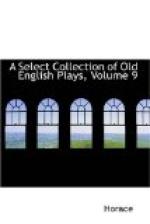[166] [Cromwell did not die till September 3, 1658, a sufficient reason for the absence of the allusion which Reed thought singular.]
[167] [i.e., The human body and mind. Microcosmus had been used by Davies of Hereford in the same sense in the title of a tract printed in 1603, as it was afterwards by Heylin in his “Microcosmus,” 1621, and by Earle in his “Microcosmography,” 1628.]
[168] Skene or skane: gladius, Ensis brevior.—Skinner. Dekker’s “Belman’s Night Walk,” sig. F 2: “The bloody Tragedies of all these are onely acted by the women, who, carrying long knives or skeanes under their mantles, doe thus play their parts.” Again in Warner’s “Albion’s England,” 1602, p. 129—
“And Ganimaedes we are,”
quoth one, “and thou a prophet trew:
And hidden skeines
from underneath their forged garments drew,
Wherewith the tyrant and his
bawds with safe escape they slew.”
—See the notes of Mr Steevens and Mr Nichols on “Romeo and Juliet,” act ii. sc. 4.
[169] The edition of 1657 reads, red buskins drawn with white ribband. —Collier.
[170] Musical terms. See notes on “Midsummer’s Night’s Dream,” vol. iii. p. 63, and “King Richard III.” vol. vii. p. 6, edit. 1778.—Steevens.
[171] A metaphor drawn from music, more particularly that kind of composition called a Ground, with its Divisions. Instead of relish, I would propose to read flourish.—S.P.
[172] Mr Steevens supposes this to be a musical term. See note on “Richard II.” act ii. sc. 1—
“The setting sun and music at the close.”
[173] Fr. for whistlings.—Steevens.
[174] i.e., Petitionary.—Steevens.
[175] [Altered by Mr Collier to girls; but gulls is the reading of 1607.]
[176] Like an ordinary page, gloves, hamper—so the first edition; but as the two last words seem only the prompter’s memoranda, they are omitted. They are also found in the last edition.—Collier.
[177] Ready.
[178] Graceful. See Mr Malone’s note on “Coriolanus,” act ii. sc. 1.
[179] [Edits., blasting.] I would propose to read the blushing childhood, alluding to the ruddiness of Aurora, the rosy morn, as in act iii. sc. 6—
“Light, the fair grandchild
to the glorious sun,
Opening the casements of the
rosy morn,” &c.
—S. Pegge.
[180] So in “Hamlet,” act i. sc. 1—
“But, look, the morn,
in russet mantle clad,
Walks o’er the
dew of yon high eastern hill.”
[181] A fool’s bauble, in its literal meaning, is the carved truncheon which the licensed fools or jesters anciently carried in their hands. See notes on “All’s Well that Ends Well,” act iv. sc. 5. —Steevens.




